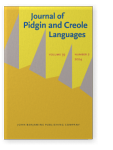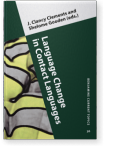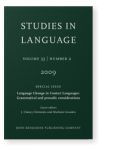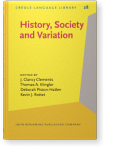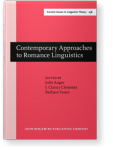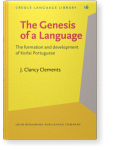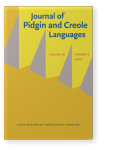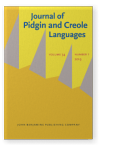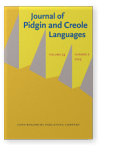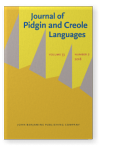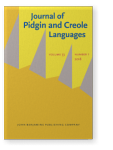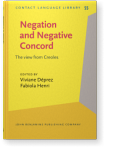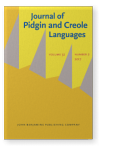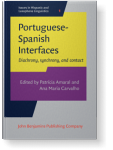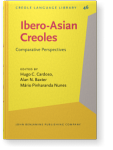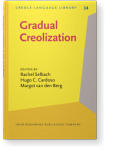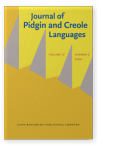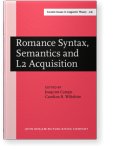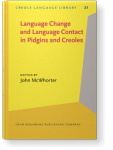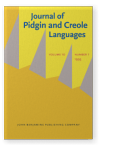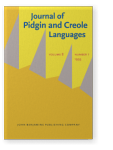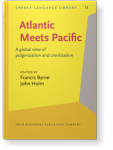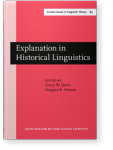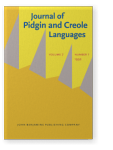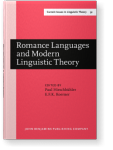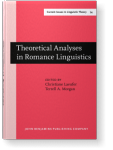J. Clancy Clements
List of John Benjamins publications for which J. Clancy Clements plays a role.
Journal
Language Change in Contact Languages: Grammatical and prosodic considerations
Edited by J. Clancy Clements and Shelome Gooden
[Benjamins Current Topics, 36] 2011. v, 241 pp.
Subjects Contact Linguistics | Creole studies | Historical linguistics | Sociolinguistics and Dialectology | Typology
Language Change in Contact Languages: Grammatical and prosodic considerations
Edited by J. Clancy Clements and Shelome Gooden
Special issue of Studies in Language 33:2 (2009) 250 pp.
Subjects Contact Linguistics | Functional linguistics | Theoretical linguistics | Typology
History, Society and Variation: In honor of Albert Valdman
Edited by J. Clancy Clements, Thomas A. Klingler, Deborah Piston-Hatlen and Kevin J. Rottet
[Creole Language Library, 28] 2006. vi, 304 pp.
Subjects Contact Linguistics | Creole studies | Historical linguistics | Sociolinguistics and Dialectology
Contemporary Approaches to Romance Linguistics: Selected Papers from the 33rd Linguistic Symposium on Romance Languages (LSRL), Bloomington, Indiana, April 2003
Edited by Julie Auger, J. Clancy Clements and Barbara Vance
[Current Issues in Linguistic Theory, 258] 2004. viii, 404 pp.
Subjects Romance linguistics | Theoretical linguistics
The Genesis of a Language: The formation and development of Korlai Portuguese
J. Clancy Clements
[Creole Language Library, 16] 1996. xviii, 281 pp.
Subjects Contact Linguistics | Creole studies | Romance linguistics
2024 The rhotics of the Salvador, Bahia variety of Brazilian Portuguese Journal of Pidgin and Creole Languages: Online-First Articles | Article
Brazilian Portuguese has two rhotic phonemes: the alveolar flap /ɾ/ and another variable phoneme. This phoneme has been cited as velar, uvular, and glottal fricatives, as well as alveolar trills and approximants. Variability of surface forms occurs both within and across varieties. This phoneme… read more
2020 William J. Samarin: 7 February, 1926 – 16 January, 2020 Journal of Pidgin and Creole Languages 35:2, pp. 207–212 | Obituary
2018 Speech communities, language varieties, and typology Journal of Pidgin and Creole Languages 33:1, pp. 174–191 | Article
2018 Negation in Korlai Indo-Portuguese Negation and Negative Concord: The view from Creoles, Déprez, Viviane and Fabiola Henri (eds.), pp. 211–224 | Chapter
Korlai displays patterns in negation largely similar to those found in Marathi, the adstrate language. An example of this is the apparent calque of the Marathi negative construction with ‘want’, where Korlai ni kɛ ‘don’t/doesn’t want’ (negator ni with a reduced form of keré ‘want’) corresponds to… read more
2017 Ansaldo, (Ed.), 2012. Pidgins and creoles in Asia Journal of Pidgin and Creole Languages 32:2, pp. 458–461 | Review
2014 Form selection in contact languages: Evidence from some Portuguese-
and Spanish-lexified contact varieties Portuguese-Spanish Interfaces: Diachrony, synchrony, and contact, Amaral, Patrícia and Ana Maria Carvalho (eds.), pp. 377–401 | Article
It is commonly assumed that during pidginization and creolization, morphosyntactic complexity of the lexifier languages is significantly reduced such that the number of affixes, clitic forms, and unstressed function words decreases substantially. In this study, I appeal to the frequency of use of… read more
2012 Notes on the phonology and lexicon of some Indo-Portuguese creoles Ibero-Asian Creoles: Comparative Perspectives, Cardoso, Hugo C., Alan N. Baxter and Mário Pinharanda-Nunes (eds.), pp. 15–46 | Article
In this study, the focus is on three key differences in five Indo-Portuguese creoles: differences in phonological inventory, in the core lexicons, and in the syllable structure of the creoles. An account for these is based on two criteria and the distinction between borrowing and shift. The… read more
2011 Language change in contact languages: Grammatical and prosodic considerations: An introduction Language Change in Contact Languages: Grammatical and prosodic considerations, Clements, J. Clancy and Shelome Gooden (eds.), pp. 1–18 | Article
2009 Gradual vs. abrupt creolization and recent changes in Daman Creole Portuguese Gradual Creolization: Studies celebrating Jacques Arends, Selbach, Rachel, Hugo C. Cardoso and Margot van den Berg (eds.), pp. 55–75 | Article
This paper recasts the dichotomous view of gradualist vs. abrupt creolization as a continuum. It is suggested that the rapidity of creolization would ultimately depend, not on linguistic factors, but rather on the social conditions of the contact situation (Thomason and Kaufman 1988: 35). In such a… read more
2009 Language change in contact languages: Grammatical and prosodic considerations: An introduction Language Change in Contact Languages: Grammatical and prosodic considerations, Clements, J. Clancy and Shelome Gooden (eds.), pp. 259–276 | Article
2006 The lexicalization — grammaticalization continuum History, Society and Variation: In honor of Albert Valdman, Clements, J. Clancy, Thomas A. Klingler, Deborah Piston-Hatlen and Kevin J. Rottet (eds.), pp. 77–101 | Article
2006 Introduction History, Society and Variation: In honor of Albert Valdman, Clements, J. Clancy, Thomas A. Klingler, Deborah Piston-Hatlen and Kevin J. Rottet (eds.), pp. 1–8 | Miscellaneous
2002 Two Indo-Portuguese Creoles in contrast Journal of Pidgin and Creole Languages 17:2, pp. 191–236 | Article
This paper presents a comparative study of two Indo-Portuguese creoles, Korlai Creole Portuguese (KP) and Daman Creole Portuguese (DP). Using recently collected data, the phonology, pronominal systems, TMA markers, syntactic properties, and lexical items of KP and DP are compared and contrasted.… read more
2001 Word Order Shift and Natural L2 Acquisition in a Portuguese Creole Romance Syntax, Semantics and L2 Acquisition: Selected papers from the 30th Linguistic Symposium on Romance Languages, Gainesville, Florida, February 2000, Camps, Joaquim and Caroline R. Wiltshire (eds.), pp. 73–88 | Article
2000 Wh-words and Question Formation in Pidgin/Creole Languages Language Change and Language Contact in Pidgins and Creoles, McWhorter, John H. (ed.), pp. 459–498 | Article
1993 Rejoinder to Naro's "Arguing About Arguin" Journal of Pidgin and Creole Languages 8:1, pp. 119–124 | Miscellaneous
1993 A Contribution by an Old Creole to the Origins of Pidgin Portuguese Atlantic Meets Pacific: A global view of pidginization and creolization, Byrne, Francis and John Holm † (eds.), pp. 321–332 | Article
1992 Elements of resistance in contact-induced language change Explanation in Historical Linguistics, Davis, Garry W. and Gregory Iverson (eds.), pp. 41–58 | Article
1992 Foreigner Talk and the Origins of Pidgin Portuguese Journal of Pidgin and Creole Languages 7:1, pp. 75–92 | Article
In this study it is argued that what Naro (1978) calls the Reconnaissance Language (RL) was not a pidgin language but simply an instance of foreigner talk (FT). Historical evidence is presented from which it can be reasonably inferred that Portuguese FT must have existed before the RL was… read more
1992 Semantics of Control, Tense Sequencing, and Disjoint Reference Romance Languages and Modern Linguistic Theory: Selected papers from the XX Linguistic Symposium on Romance Languages, University of Ottawa, April 10–14, 1990, Hirschbühler, Paul and E.F.K. Koerner † (eds.), pp. 45–56 | Article
1992 Lexical category hierarchy and “head of compound” in Spanish Theoretical Analyses in Romance Linguistics: Selected papers from the Linguistic Symposium on Romance Languages XIX, Ohio State University, April 21–23, 1989, Laeufer, Christiane and Terrell A. Morgan (eds.), pp. 151–166 | Article
